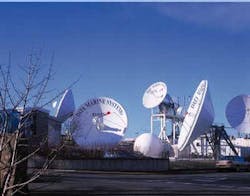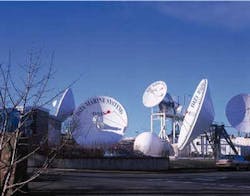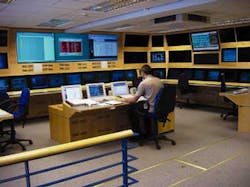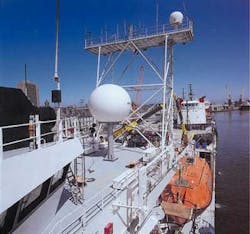Network, tools assist producers, service companies in communications
No matter how hard we try, the law of unintended consequences seems to follow. Usually the consequences are negative, but on rare occasion, the unintended becomes a great good. Such is the case with the interaction of Internet technology and the oil industry's need to reduce cost in a critical area - information management.
In the late 1980s, there was a realization that a significant reduction in the general overhead cost of oil operations was needed in the North Sea. The tool chosen for this effort was outsourcing. Instead of companies providing logistical and other services from in-house departments, whole segments of 'non-core' services were cut out of companies.
Contracts were let to third-party service providers to fulfill the routine needs of oil company operations. Some contractors took over oil company logistics departments to manage the former in-house activities. Today, up to 80% of oilfield project management, logistical supply, reservoir characterization, and many other activities are handled by third parties.
Outsourcing tools
The CRINE initiative in the North Sea helped standardize outcomes in the outsourcing effort during the mid-1990s, but well before that time companies found that the outsource vendors needed critical in-house information in order to provide effective service and efficient delivery of men, equipment, and goods. At the same time Internet technology was evolving.
Within BP, the information technology department was given the task of building a dedicated network to link its offices with vendors. Outsourcing quickly proved the need for a new solution, which could facilitate the movement of data, improve productivity, and drive down costs.
Similar efforts were taking place at other production firms, which led to a multitude of computer configurations and significant problems in cross-linking different vendors and joint venture partners across the growing computer nets. Each vendor had to dedicate a PC and connections to each company it serviced. A similar expansion of equipment took place inside BP to communicate with its vendors.
In addition, each company had to manage the connections separately, again duplicating effort. This lead to growing staffing costs in computer and Internet disciplines, areas outside of oilfield expertise. Rather than saving money, the outsourcing effort was getting expensive due to expanding communications.
Reducing costs
To overcome additional costs, Data Marine Systems (DMS) Ltd. of Aberdeen, UK, was created to handle the cross-communication efforts. It is an example of similar E-commerce efforts taking place across the globe. The firm extended the 'community of interest' approach to all oil industry businesses, searching for economies of scale and consistency of services. Individual company networks ultimately consolidated into the Dexa Net Oil Partnering Network (OPN).
OPN began to grow and become a better tool as more companies connected to the system. Outsourcing services for network management became routine and evolved into 24-hr data delivery and 24-hr manning of the support center to monitor networks and clients. All the routers are hosted at one secure facility.
Connections between vendors and clients became a matter of running a cable from one router to another, then enabling the software. Security and reliability were provided in the process. For normal petroleum operations, OPN connects drilling, weather, personnel, and application access. The system provides the service at significantly less than companies would pay to build and support in-house systems.
Wider picture
What is happening with networks is nothing new. Many businesses altered practices to cooperate on non-core functions, which freed them to compete on essential functions. This happened in airlines, banks, and insurance companies:
- Airlines cooperate on service to compete on ticket sales.
- Banks cooperate on back-office operations to compete for accounts and loans.
- Insurance firms cooperate on settlements to compete for policies.
The key behind this change is improving a company's major business focus. In theory, by outsourcing non-competitive work, the company could exploit its competitive advantage (the core business). That outsourced work could then be done most efficiently by vendors specializing in that business. The major thrust of outsourcing is to free a company to do what it does best.
According to Jim Michie, Datacomms Manager, digital business is the next wave for increasing information flow from offshore activities, improving decision making, and capturing other benefits. "OPN is a small piece of lubrication in the larger (oil industry) machine."
Response
Global Marine began using OPN five years ago and is presently operating five rigs in the North Sea and 10 rigs off West Africa. All are using the VSAT system (satellite communications industry standard) from DMS. Prior to the rental and installation of the systems, the company only had voice communication by radio or Inmarsat satellite.
Scott Murray, Manger-MIS International for Global, sited several advantages over the earlier system. With the Internet system, rigs can use e-mail services to remain in contact with clients and better maintain their facilities. Maintenance request turnaround is now a matter of seconds instead of a month or more. The system provides:
- Improved reliability
- Direct access to oil companies computer systems
- Ease of set up
- Private email links for clients.
Opening access to the Internet as well as to corporate intranets removes employee isolation and improves teamwork. The developers state that improved voice communication creates more privacy than radio and is as secure as a landline. The ability to stay connected with families back home has improved the company's employee retention. Murray emphasized that VSAT communications is now standard practice for its rigs and is a negotiation point from the very beginning on new contracts.
ASCO is a logistics company that specializes in ground transport. Much of its business involves moving material to Peterhead, Scotland for oil industry supply bases. According to Jason Gray, ASCO's Corporate IT Manager, there were often problems in the past getting the right materials to the right location, and even to the right rig, because of poor communication or late faxes. Often there were last minute changes to an order that were never communicated or got routed to the wrong people. Moving to the OPN network made it easier for users to make last minute changes to orders and to track orders, he explained.
The system also allows the company to better coordinate supply boat activity and optimize their business. It also has increased security and provides links to third parties. By aligning ground and vessel shipping schedules, the supply boats leave port with a full load. They make deliveries to two or more rigs or platforms, rather than servicing one offshore facility per run.
The increased efficiency is meeting some resistance from drilling contractors. In the past, contractors had dedicated supply boats, which they could call at will. With the new system, if a driller can "wait for the bus, instead of taking the taxi," there is a significant cost savings to his company, according to Gray.
ASCO is developing a software program for global logistics and marine information system, called Glamis. Glamis, named after a local castle, will be hosted at DMS to add more efficiency to the logistics process.
BP estimates that by increasing information efficiencies it can produce an additional 200,000 b/d of oil from its North Sea fields. This is the oil flow equivalent to a new field. Beyond the North Sea effects, the application of Internet and satellite communications to oil producing areas around the globe should greatly improve value chain productivity by removing less efficient in-house processes. Integrated thinking is not yet widespread, but will soon be available as close as the desktop PC.
How Dexa Net OPN expanded
The Dexa Net Oil Partnering Network (OPN) was created as a hub and spoke system, starting with eight companies carrying ordinary work-a-day information. Drilling units began to use the system and by 1997, North Sea oil companies accepted the concept as reliable and secure enough to communicate with each other. Subsequently, the company was purchased by Schlumberger and is now a part of the Schlumberger Network Solutions Dexa Suite of Services. The network connects more than 100 companies at present and more are added each month.
Cisco switching equipment is the backbone of the system with individual routers connected by Ethernet. The 10-megabit system was upgraded to one gigabit Ethernet, with up to 34 megabits per customer available for demand surges. The system is assured by redundant power including both UPS backup and diesel generators. The company has ISO 9001 creditation and is open to audit by users. A key point is the 99.98% network availability.
Data Marine Systems (DMS) provides the stabilized satellite terminals, which are made in three dish antenna sizes, with diameters of 2.4 meters, 1.8 meters, and 1.2 meters. The dishes allow implementation of the satellite link on any vessel. The largest dishes receive a stronger signal and reduce the power required from the satellite (and thus the cost).
The 2.4-meter-system operates in Ku and C-band and is the most common for ship and rig use. It uses three gimbaled low-speed, high torque, direct drive motors to keep the dish on station. The 1.2-meter-unit is more compact and less expensive, although the space segment is more expensive.
OPN expanded into Internet services, hosting data and software applications for many companies. Users include Opito and the Wood Group. Opito is the UK-sponsored Oil and Petroleum Industry Trading Organization that uses a Smartcard system for tracking individual employees. Wood Group uses a single e-mail account that allows 65 different companies around the world to stay connected, which means that 3,000-4000 employees can use e-mail hosting through the Internet. Application service provider services became an associated business for DMS. The network hosts applications for third party use.
The Dexa Net suite also connects OPN to other Internet communities. This opens the opportunity for real-time video offshore through closed circuit TV. Downhole video, handheld video for trouble shooting, and tele-medicine are other possible uses.
Driving an upgrade of OPN capacity is BP's new fiber optic links to North Sea installations. These links are expanding the available bandwidth, allowing remote control of facilities, and providing Internet telecom service offshore.
Schlumberger is expanding Dexa Net operations into the Gulf of Mexico and Brazil. The firm recently opened a facility in Houston. In October, it will open a facility north of Rio de Janeiro, in Macaé, Brazil, where an earth station has been constructed. The new facility will begin satellite services using two antennas - 3.8 meters and 7.3 meters in diameter.
Transocean Sedco Forex is using the 3.8-meter-antennas for six drilling rigs and is connecting them to the mainland through Dexa Net's onshore facility. From Macaé, they are connected to the company's world headquarters. According to the firm, other drillers considering the service are Diamond Offshore Brazil, Noble do Brazil, and Pride.



